Jude Knight's Blog, page 59
June 12, 2021
A prayer-poem for Sunday

Would I might wake St. Francis in you all,
Brother of birds and trees, God’s Troubadour,
Blinded with weeping for the sad and poor;
Our wealth undone, all strict Franciscan men,
Come, let us chant the canticle again
Of mother earth and the enduring sun.
God make each soul the lonely leper’s slave;
God make us saints, and brave.







June 10, 2021
Paradise is a garden

The Paradise Garden at Hamilton Gardens
Creative inspiration is a strong and wonderful thing. Artists — storytellers in particular — are often asked where their ideas come from. The answer ‘everywhere’, though true, is unhelpful. What questioners really want to know is ‘why did this idea strike you at this time’.
The Greeks credited the muses — nine goddesses who inspired the arts. The Jews spoke of Holy Wisdom. My friend Caroline Warfield calls inspiration the girls upstairs. I tend to blame an infestation of plot elves.
Stories and the elements that enrich the weave of a story are all around us all the time. Most people notice one or two of the hundreds of possible ideas that pass them every day. An author might pick up a dozen. Knowing what to do with them matters more.
Several years ago, Caroline and her beloved visited New Zealand. On the day they arrived, we had lunch at Hamilton Gardens, which has more than a dozen themed gardens: Japanese, English cottage, Chinese, Maori vegetable, formal Italian.
We were both writing novellas for the coming Belle’s Christmas collection, Follow Your Star Home, and in the Mughal garden, I found a unifying idea that later became the inspiration for the title of the book, the name of the kingdom my hero and heroine rule, and one of the locations for the story. My photos of that garden also appear on the cover.
The hero and heroine were the parents of the lead characters in my current series, The Return of the Mountain King, and the novella is now published as a prequel. It is called Paradise Regained. I’m currently publishing the companion volume, about the girl James left behind when he left England, on Mondays. It is called, of course, Paradise Lost. Once I finish the fourth novel in the series, which will be within the month, I’m going to write a happy ending for my poor duchess, call it Paradise Attained, and publish it in a volume with the other two novellas.
Paradise is a garden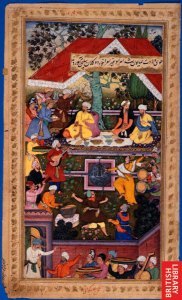 The garden we found in Hamilton was a chahar bagh. The term means ‘four gardens’. It’s a quadrilateral layout, with the quarters divided by walkways or flowing water into four smaller parts and a pavilion at one end raised on a terrace. One of the world’s most famous tombs, the Taj Mahal, was originally a chahar bagh, though only two of the gardens remain.
The garden we found in Hamilton was a chahar bagh. The term means ‘four gardens’. It’s a quadrilateral layout, with the quarters divided by walkways or flowing water into four smaller parts and a pavilion at one end raised on a terrace. One of the world’s most famous tombs, the Taj Mahal, was originally a chahar bagh, though only two of the gardens remain.
Gardens divided by watercourses first appeared in Mesopotamia, and were later adopted by the followers of Islam. It may have been the Islamic influence that fixed the shape to four, referencing the four gardens of Paradise that are mentioned in the Qur’an. Genesis, too, mentions the central spring that feed four rivers, each flowing into the world beyond. The concept travelled with Islam, so charar bagh gardens are found from India to Morocco.
“In Chahār-Bāghs, terraces symbolize the cosmic mountains, the creation of the edifice or throne at the highest level represents the position of God. A great pool is placed in front of the edifice representing the cosmic ocean as the source of all waters which can irrigate the whole garden. The presence of trees, flowers and animals around the edifice complement the figure of the universe” (Farahani, Motamed & Jamei, 2016 — from https://www.researchgate.net/publication/321014499_A_discourse_on_the_Persian_Chahar-Bagh_as_an_Islamic_garden).
The wall is a crucial design feature in making this a Paradise Garden. Indeed, the words para daisa mean walled garden — pairi = around, daeza = wall or brick.
As a gardener myself, I appreciate the protection a wall can offer a garden, and I also think of Francis Bacon’s quote as I garden.
Paradise RegainedGod Almighty first planted a garden. And indeed, it is the purest of human pleasures.
In Paradise Regained, you’ll find the heroine, Mahjad, relaxing in the chahar bagh her husband built for her as a wedding present. Mahzad and James have called their kingdom, built high in the Kopet Dag mountains between Iran and Turkmenistan Para Daisa Vada — Paradise Valley. And the story is about temptation — particularly for James.
In discovering the mysteries of the East, James has built a new life. Will unveiling the secrets in his wife’s heart destroy it?
James Winderfield yearns to end a long journey in the arms of his loving family. But his father’s agents offer the exiled prodigal forgiveness and a place in Society — if he abandons his foreign-born wife and children to return to England.
With her husband away, Mahzad faces revolt, invasion and betrayal in the mountain kingdom they built together. A queen without her king, she will not allow their dream and their family to be destroyed.
But the greatest threats to their marriage and their lives together is the widening distance between them. To win Paradise, they must face the truths in their hearts.
Find buy links at Books2read https://books2read.com/paradiseregained
***
This video shows the Paradise Gardens section of Hamilton Gardens. The chahar bagh is on from 3:12 to 3:46, but the rest are lovely, too.
***
Excerpt
The courtyard had been designed to catch and hold the fickle warmth of the mountain sun. Even in early winter, Mahzad and her ladies chose to settle in the pavilion, out of the direct heat, though the children and their nursemaids played on the paving by the cross-shaped pool at the centre of the garden.
James had ordered it built: a paradise garden on the Persian chahar bāgh model, centred on water and divided into four quadrants, each richly planted in vivid colours. It had been her wedding present, and somehow, their tribe had managed to keep it a secret from their queen, though the qaḷʿa, the citadel, buzzed with intrigue until James had brought her here, blindfolded.
It had been full summer, and the garden had been glorious but not as beautiful to her eyes as the face of her husband, eyes alight with mischief, with love, and with a promise for later that night when the court was asleep. They had crept down when the qaḷʿa fell silent, giggling when the patrolling guards politely averted their eyes. Mahzad was confident their eldest son, Jamie, had been conceived that night.
She had been so in love, had been convinced that James had forgotten the English woman for whom he was exiled from his home and had fallen in love with her.
Eleven years and eight children later, her love was deeper and stronger than ever, but she no longer believed that James returned the feeling. He was fond of her, yes. He respected her as his wife and queen, katan to his kagan, but the passion of the soul? No. She reached for it with her own and met only the barrier of blank civility with which he armored himself from the world.
When he was home, he was distant if polite, and he had not been home in more than seven months. His trips away had become longer and longer, his letters home more and more formal. He was about the business of their kaganate, which prospered under their rule, but he had never before failed to be home for a birth of one of their children.
Mahzad dropped a kiss on baby Rosemary’s dark hair, handed the sleeping baby to the hovering nursemaid, and sent one of her ladies to summon her secretary. She had work to do. She was co-ruler of their people and did not have time to waste mourning the fickleness of men.
The messenger was only halfway down the long side of the garden when Patma came hurrying down the steps from the zenana, the women’s section of the palace. Even from the other end of the garden, Mahzad could see that her secretary was agitated about something. She had lost the calm she had adopted as chief of Mahzad’s scribes, her usual elegant glide abandoned for a walk that bordered on a run, her eyes wide with excitement. She was not surrounded by the bevy of undersecretaries who carried her desk and writing tools, prepared her ink, ran her messages, and made copies of lesser documents.
No. There they were, just stepping out of the long doors onto the zenana’s terrace. Patma must have hurried some distance to have so outstripped them.
The secretary did not pause when she passed Mahzad’s messenger, speaking over her shoulder as she skirted a small child pushing a toy pony and hurried up the steps to the pavilion. She stopped at the top of the steps to kick off her footwear before venturing on to the rugs that lay everywhere and then composed herself enough to offer a polite greeting, bowing as she said, “Peace be upon you, my queen.”
“Peace, most excellent of scholars,” Mahzad responded, inclining her head as she waited for the younger woman to burst with whatever news she carried.
(The original version of this post was written for Highlighting Historical, Caroline Warfield’s blog, in 2019.)







June 8, 2021
Reunited on WIP Wednesday
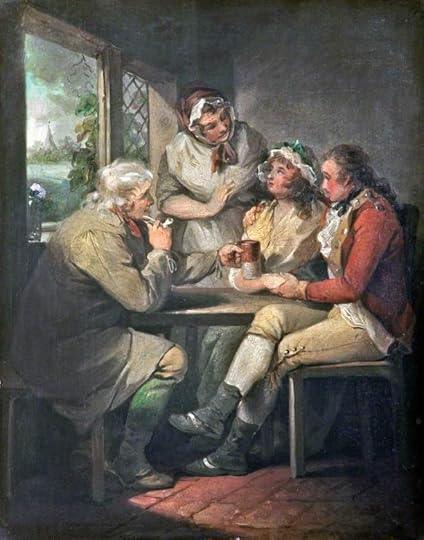
Morland, George; The Soldier’s Return; Lady Lever Art Gallery; http://www.artuk.org/artworks/the-sol...
A lot of my short stories and novellas use the childhood sweethearts reunited plotline. It’s fun, for one thing. It lets me use more mature characters, for another. And, in shorter fiction, it gives credibility, since the romance can continue from where it left off once they are reunited, rather than needing to develop from first attraction to happy ending in just a few thousand words.
Here’s the opening of my next newsletter short story, due to be sent out in the next few days. If you have a reunion scene, please feel free to share it in the comments.
At first, Magda thought it a prank. There Luke was, stretched out prone across the vegetable garden between the onions and the cabbages, crushing the spring carrots. At any moment, he would leap up laughing, as he had once before, long ago, when they were children.
Perhaps not a prank, then, but a humorous reminder of the years of their friendship, long ago, before the earl’s younger son was sent away to join the army a month from his eighteenth birthday. He’d been gone for fifteen years, until she spied him in the tavern this afternoon, drinking with their old friends from the village, Will from the tavern and Ned from the forge.
After Luke left, Will and Ned had not been able to stand out against their parents and maintain—at least in public—their friendship with the witch’s by-blow granddaughter against the steadfast enmity of the wives of both the squire and the earl.
They were sisters, Luke’s mother Lady Compton, now the Dowager Countess, and Lady Frederick Barlow, widow of the squire who had preferred to ignore Magda’s existence and mother of the squire who, even today, made her life as difficult as he could.
Despite their parents and the two ladies, Will and Ned watched over her from a distance, keeping the squire’s sons from any but the more the subtle forms of persecution. Several times they had risked their own necks, or at least the displeasure of the two most prominent families in the district, to protect her from unpleasant advances and outright assault by nasty friends visiting the young gentlemen of those families.
Old friendship, too, must have been the reason why Will employed her as a cook, once he took over his father’s tavern. A job meant wages so she could look after Gran, and save a nest egg to escape from this place.
Luke was still lying on her carrots. Perhaps he did not realise she was there. “Luke?” Though she supposed, now that she was no longer fifteen nor he eighteen, she should call him Lord Lucas. Or Major De Grenville, perhaps. “Major De Grenville?”
He did not move. Did not spring to his feet, his sea-blue eyes dancing, asking her to share the joke. Now that she was closer, she saw the bruise on his cheek, and a trickle of blood, dried now, that had meandered down his neck from the hair at the back of his head.
She leaned closer; skimmed her fingers over the matted evidence of an assault or fall. Though if a fall, he must have descended from a height head first, for the lump was high up in his hair and had split with the force of the blow.
Magda felt for the pulse in Luke’s neck, and released a breath she had not been aware of holding when it throbbed, strong and even, under her fingers. She pressed his left shoulder with her hand and spoke to him again. “Major De Grenville?”







June 6, 2021
Tea with Eleanor: Paradise Lost Episode 7

“Your Grace, enclosed please find reports of the interviews I conducted on your behalf into the journey of the boy David. He seems a nice lad. I will look forward to hearing how he goes on. Sincerely yours, Tolly.
***
Gerald Ficklestone-Smythe
Manager of Cowbridge Mine, Llanfair
The boy was gone when I got back from the funeral. Little bastard. I told him I’d kick him to next Tuesday if dinner wasn’t on the table, but nothing was prepared, and he was nowhere to be found. And he’d let the fire go out. He’ll come back when he’s hungry, and I’ll have the skin off his back, see if I don’t.
Where else is he going to go? London? To the duchess? My slut of a daughter told the boy to go to the duchess when she was dead, but he is stupid if he thinks she’s going to want her husband’s by-blow, and so I told him when I took the money she’d left with his mother. I had a right to it, didn’t I? I took his mother back after the duke had finished with her. I gave her a home. I even let her keep the boy.
The duke owed me that money. Yes, and more. Made a harlot out of my daughter, and turned her off with a measly few hundred pounds. Wouldn’t pay more when that ran out. Then, when my daughter lay dying and couldn’t keep house for me anymore, that pernicious swine sent his wife to steal the boy I raised, promising him I don’t know what.
Now the bitch is dead, and the boy can’t be found, but where could he have gone? He has no money for the coach fare, and it’s a long walk to London, especially with winter coming on, and the Black Mountains between here and England.
He’s no fool, the boy. He’ll be back.
***
Jeremiah Penchsnith
Captain of the Merry Molly, Bristol
We didn’t find the lad till we was near Avonmouth. ‘E was ‘id in the coal, but we saw ‘im when ‘e tried to escape over the side. ‘E fair wriggled when we caught ‘im, begged us to let ‘im go. But ‘e owed us ‘is passage, and so I told him.
If we let away every lad who wanted a free trip over the Bristol Channel, we might as well set up as a ferry, and that’s what I said.
Give the lad credit, ‘e worked ‘ard. Four trips ‘e did wiv us, not counting the first. And then he left us in Bristol. I’d’ve kept ‘im on, I would. Good worker, that lad. I ‘ope ‘e gets where ‘e’s going.”
***
Maggie Wakefield
Farmer’s wife, Ditchford Frary, East Cotswolds
He was a mystery, young David. Turned up in a snow storm, he did. Bessie the dog found him when Matthew went out after the sheep, huddled up in the midst of the flock where they’d taken shelter in the lee of the old stone wall.
Matthew brought them all home: boy and sheep, the boy limping along on a stick because his ankle was swollen to twice its size. “I’ve a lamb for you to warm by the fire, mother,” Matthew said, and then stood aside. Just a sprain, it turned out to be, but a bad one. I would not turn man or beast out in weather like that, let alone a boy, and no more would Matthew, so of course we let David stay.
Where did he come from in that awful weather? Wales, he said, but that couldn’t be, could it? Wales is a long way away, across the wolds and then the water. And mountains, too, they say.
David was a good boy, so perhaps he was telling the truth. He made himself useful until he could walk again. He was a good hand in the kitchen, and he read to me and Matthew at night, which was a great blessing, for our eyes are not what they were. Not that I’ve ever read more than enough to piece together a few verses from the Bible. Not like David. It was a treat to listen to him, and I was sorry when he left.
But he had people waiting for him, he said, so off he went, off to London. We got him a lift as far as Oxford with Jem Carter. I hope he made it to his people. A fine boy like that? They would have been missing him, I’m sure.
***
Sir Philip Westmacott
Gentleman, London
My tiger? He’s taken off. Ungrateful brat. Good boy with the horses, too. But there you go. That’s what I get for taking a boy off the streets. I found him in Oxford, you know. Oh yes, I told you before, didn’t I. He made sure I got back to my inn after a rather exciting evening. Didn’t rob me, either, though he could have. I was somewhat—er—elevated.
I told him to come back in the morning for his reward, and he was waiting outside in the stable yard when I woke. And all he wanted was to come to London with me. I bought him a suit of clothing, of course. Couldn’t be seen with him in the rags he had. Not livery. Not in Oxford. But I thought silver blue, to set off his dark hair. It would have looked stunning against my matched blacks.
We arrived late at night, and in the morning he was gone. Ungrateful brat.
***
Henry Bartlett
Gatekeeper, Haverford House, London
Of course I didn’t let him in. A boy like that? Tidily dressed enough, and nicely spoken, but what child of substance is allowed to walk around the streets? But he wasn’t a street urchin, neither. He asked if he could send a note, and he wrote it right there on a piece of paper I found him. Never was a street urchin that could read and write.
Anyway, I sent it in to the duchess. Told him he’d have to wait, but it wasn’t but an hour before Her Grace’s own maid came down to fetch him, and the next thing I knew, he was part of the household.
He seems a pleasant enough lad; always polite. But it just doesn’t seem right, raising the duke’s bastard under the same roof as his legal sons. The duke agrees, or so goes the talk in the servant’s hall. But the duchess got her way, this time. And we’re all to treat the boy as if he were gentleman. Her Grace has hired him a tutor, and word is he’s off to Eton in the autumn. And the little Marquis follows him around like a puppy dog.
What will be the end of it, do you suppose?







June 5, 2021
Why I write — and why historical romance

At the weekly book talk that my Bluestocking Belles’ sisters and I hold on Facebook, today’s topic was ‘Why do we do what we do’. That is, why do we authors write and sell books.
Great topic, so I thought I’d answer it again here.
Why do I write?I write because otherwise the stories build up in my head and if I don’t shape them and form them into a completed story, I’m afraid my head will explode. This happens. When for some reason I can’t write, I begin to have really weird vivid dreams that wake me up, and snippets of story also attack me during the day when I ought to be doing something else. I
It is true that when the writing is going well, I also have vivid and specific dreams in which my subconscious minds solves plot problems. I also either can’t get to sleep or wake up from sleep with a section of story that I just have to get down. And I think in story all day long, even when I should be doing something else.
On the other hand, when I’m not writing, I also get jittery, anxious and bad tempered. Writing keeps me even.
If you think it sounds like some sort of addiction, you are probably right.
Why do I write historical romance?I write what I love. I have written in a number of genres, but the first fiction book I published was an historical romance (Candle’s Christmas Chair), and I wrote that while waiting for beta reading feedback on the first novel I’d finished in nearly forty years, also historical romance (Farewell to Kindness).
When I started Farewell, I had collected more than 40 plots, most of them historical romance and all of those regency. Regency romance is one of my favourite genres for my own reading. I find it absorbing when it is done well. And when it isn’t, I’m inspired to do better. I find the Regency era fascinating, and a great medium through which to think about issues and challenges that face couples, families and our society today.
Here’s a blog I wrote five years ago about the ten reasons I read (and write) historicals. Still true.
The other reason for sticking (mostly) to Regency is commercial. I haven’t finished the Regency series I’ve started, and I owe those unwritten books to my readers before I wander off into another genre. Furthermore, I’m (somewhat) known under my Regency pen name. If I write speculative fiction or contemporary mysteries or even in another era, do I need another pen name? Will I need to find an entire group of new readers? Will I upset my current readers? (Genuine questions. I don’t know.)
Why do I publish?I write for myself, in other words. But, as Caroline pointed out in our chat, I revise, polish and publish for readers.
Readers are an essential part of what makes my story into a book. As long as it is only in my head and even as long as I am the only one that has read it, it doesn’t truly exist as a book. It’s just a story I’m muttering to myself. A book has readers. The reader brings her (or his — I’m an equal opportunities romance writer) experiences and emotions to the story, interprets the characters and events through her filters, and get stuff out of the story that I didn’t know I put there.\
Every book is a collaboration between the writer and the readers, and they make the magic together.
I sell my books because the money I earn funds covers, professional copy editors, subscriptions to all the services that allow me to produce and market my books, research materials such as course in Regency London and books about Napoleonic France, and a myriad of other expenses. If I didn’t sell my books, I couldn’t afford to write them.
And I sell my books in the hopes that I will one day sell enough to make a surplus. We are now living on retirement income, so a bit of extra income would be much appreciated.
So that’s why I writeHow about you? If you’re a reader, why do you read the books you choose to give part of your life to? If you’re a writer, why do you write?
***
If you’d like to join the Bluestocking Belles and chat about books and writing, we meet every Saturday at 1pm. (New York time — it is currently at 5am Sunday morning for me in New Zealand. Roll on daylight savings changes at both ends!) The post in which we chat in the comments is always pinned to the top of the group, which is: https://www.facebook.com/groups/BellesBrigade We’d love to see you there.







June 3, 2021
Working men of the ancient highway
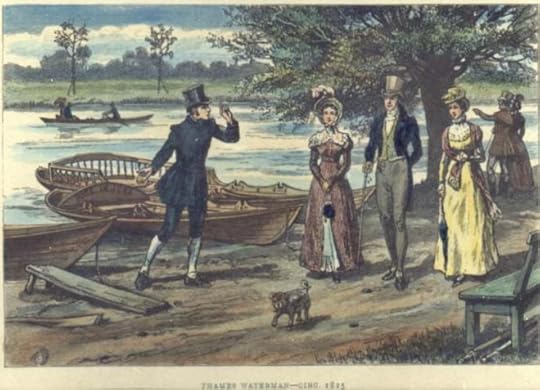
A Thames waterman soliciting for passengers
From ancient times, boats have used the Thames as a highway, carrying goods and passengers to, from, and around London. The Romans built the first bridge between their city of Londinium and what become Southwark. It was of wood, and needed to be replaced many times until the stone bridge was built in the twelfth century.
That bridge, the famous London Bridge of the nursery rhyme, with its shops and houses, remained the only bridge until Westminster bridge was built until 1750. In all that time, wherrymen and lightermen and their boats of all sizes remained the main way of crossing the river or of negotiating up and down its current. Wherrymen carried passengers; lightermen goods and cargo. By the sixteenth century, some 40,000 men made their living on or around the river. In this century, too, an Act of Parliament regulated the fares wherrymen could charge, and another, a few decades later, appointed a ruling body, the Company of Watermen and established seven year apprenticeships.
“As may easily be imagined, they formed very much of a caste by themselves… They were a rough, saucy, and independent lot, if we may judge from allusions to them which occur in the novels, comedies, farces, and popular songs of the last century.” —Old and New London Vol 3
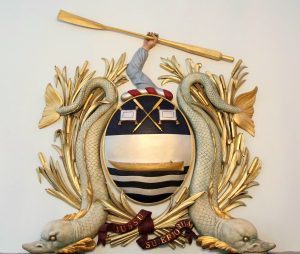
The coat of arms of the Company of Wherrymen and Lightermen
As London grew in the second part of the Georgian era and on into the Victorian years, more and more bridges were built. Still, the Thames remained a vital thoroughfare, for both pleasure and business. In the Regency, there were still over 3000 wherries (or water taxis) plying their trade in London.
Slowly, in the Victorian years, as more and more bridges connected the city to the increasingly well maintained road network and railways began to stretch over and under the river, the importance of the watermen diminished. Today, they still have more than 900 members who ply their ancient craft of the Thames, albeit mostly in a ceremonial role.
Im my novella, Melting Matilda, my hero argues about the fee that a waterman wants to charge when Charles and Matilda want walk on the frozen Thames. (The fee and the role of the watermen is accurate, the conversation is fictional.)
On Monday the thirty-first, the Thames was a complete field of ice from London Bridge to Blackfriars Bridge. The watermen, who had been barred from their usual profession for most of the month by the dangerous ice floes, quickly organized to test and then to control access to the ice. When Matilda went down to view the area she and Lady Hamner had chosen for the Haverford marquee, they demanded payment for helping her and her party over the small rivulet that had formed at the bank.
“That is outrageous,” complained Charles, at her elbow as had become usual.
“Na, jes’ think about it,” the waterman coaxed. Matilda focused to translate his thick accent into words she could understand. “People pay us to take them on the river. Doesn’t matter whether it is wet or dry. We did the same twenty odd years back, and before that, I reckon.”
“Were you here for the last Frost Fair,” Matilda asked? He certainly looked bent and wrinkled enough, what she could see of him in his greatcoat, cap, and scarf.
“That I were, me lady. And this bids fair to be a better one, it does.”
Charles paid the couple of sixpences the man demanded, and then Matilda pointed out that he had now received the value of a boat ride. “Would you escort us, and tell us about the last Frost Fair, and what you expect for this one?”
They spent half an hour listening to the waterman’s stories while they looked for a good site for the marquee and its subordinate tents—far enough from the main booths and activities of the fair that access was easy to control, and yet close enough that the ticket-holders could stroll the fair at their pleasure.
“That was clever,” Charles noted, as they settled themselves back under the furs in his sleigh. “You’ve convinced the watermen to keep that part of the ice clear, and have negotiated a fee to make entry to the ice free to anyone who shows a ticket.”
Matilda was pleased, too. “They shall do very well out of it: a lump sum deposit before the event and another afterwards, and all they have to do is keep our space clear, let our servants onto the ice to set up, and pass people who show a ticket on the third of February. Not that I grudge them. Imagine being unable to earn a living because the river you depend on freezes solid.”
“You are a remarkable woman, Matilda Grenford,” Charles said.







June 1, 2021
Kisses and feelings on WIP Wednesday
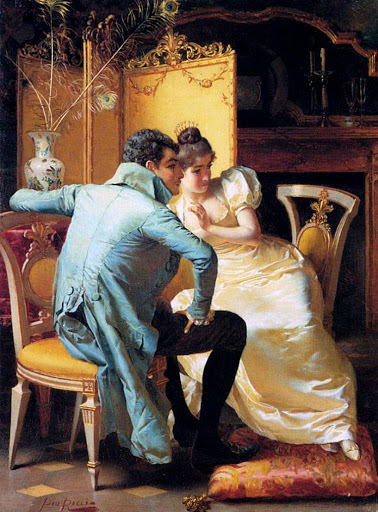
This week’s theme is kisses, and the feelings that go with them. You show me yours (in the comments) and I’ll show you mine, from To Claim the Long-Lost Lover, which will be out in July. Sarah has just invited Nate to stay with her for the night.
Nate reached Sarah’s side, and handed her a glass. “Thank you, Wilson, but I shall be maid for my wife tonight.” He kissed Sarah’s forehead, and Wilson blinked several times before bobbing a curtsey and stammering, “Yes, my lord. My lady. Um.” She bobbed again. “Every happiness. Hot water. Yes.” And still bobbing, she hurried from the room, closing the door behind her.
“Poor Wilson. I am afraid she might burst of curiosity.”
Nate ran his finger down her check and then slid a hand down her arm and across onto her breast, driving what she had been about to say completely out of her head.
His voice was husky as he commented, “She should knock before she comes in, should she?”
Sarah sipped her brandy, trying to pretend she was not going up in flames. “I hoped that was a good idea,” she told him.
He sipped his own before answering, his hand continuing its explorations, shaping her breast and then moving to the other. “An excellent idea. But I think I should not strip you naked quite yet?”
She could feel the heat rising in her cheeks. He was bold, this older, more confident Nate. “Nor I, you.” She managed the retort, and her voice barely shook.
“Perhaps a kiss, then?” he asked. His hand slid around her back to hold her firm against him, and his lips descended on hers.
For seven years, memories of their kisses and embraces had fuelled her dreams. Tender at first, almost tentative, this kiss set those memories in the shade from the first, and as the heat rose and his free hand pressed her closer; as she spiralled into a space out of time and place where nothing existed but him, the memories slipped away to be replaced by new ones.
Somehow, the glasses were gone, and both of his hands were on her, and hers on him, untying and stripping off his cravat, fumbling undone the buttons of his waistcoat, pulling his shirt from his pantaloons so she could slide her hands up under it, to stroke and caress his warm firm skin, silk over steel, much more of it than back when he had been a skinny youth just shooting up from boyhood and still inches short of his adult height.
Such random thoughts surfaced and drifted away as he released her for long enough to wriggle out of his waistcoat, pull the shirt over his head, all the while kissing her as if the touch of her lips was keeping him alive.
Then his hands were on her again, and he was kissing her neck and then lower. With her bodice now completely unfastened, her gown slipped down her body to pool around her feet, and she kicked free of it and curved her spine so that he had room to continue to feast while she pressed the rest of her body to his.
The knock on the door was repeated twice before either of them surfaced enough to notice.







May 30, 2021
Tea with Eleanor: Paradise Lost Episode 6

A Haverford townhouse in Brighton, May 1812
The package was stamped with the welcome postmark—ST PETERSBORGH, all in capitals. Eleanor guessed its origins when the butler brought it into the room, properly presented on a salver. The package itself was anonymous from across the room, but her butler’s face, usually professionally impassive, told the tale. Only dear Jonathan brought that lift to the corners of Parswarden’s lips, as if he was fighting a doting smile.
Sure enough, she recognised the slanting hand, just far enough away from a scrawl to escape his tutor’s heavy hand. She reached out for it, grinning at Parswarden. “News from Jonathan,” she affirmed. “Wait while I open it, Parswarden, and I will give you news to take below stairs.”
Parswarden’s smile almost escaped his control. “If Your Grace would be so good, I am sure Cook would be pleased to hear how our young lord is managing in those foreign parts. I will send for a tea tray for Your Grace, while you open your package, shall I?”
Fifteen minutes later, the butler sailed out of the room, as close to hurrying as his dignity would allow, eager to regale the upper servants with stories of their young lord and his adventures: racing a troika—a sleigh pulled by three horses; dancing with a Russian imperial highness; hunting wolves with a wild band of Cossacks.
Eleanor shivered at the risks he took, but she had to admit that Jonathan led a charmed life, and waltzed through danger that made her hair curl. Indeed, he had been both charmed and charming since his birth.
She smiled as she sipped her tea. He had arrived after a further miscarriage, when she had almost lost hope that the birth of a son would deliver her from the consequences of her husband’s lifestyle. Haverford had kept his word. As soon as it was certain that she was with child, he stopped visiting her, and before long she and her husband had established a pattern of separate lives, intersecting only when Eleanor would be a social or political asset to the duke.
Later that summer Haverford demanded she serve in such a role when he insisted on her joining him for a house party in Wales, where he wanted her assistance to impress a former ally who had changed sides. Later, she looked back on that chance meeting with the daughter of a local mine owner as a watershed moment in her life. The woman’s son had the Haverford hazel eyes.
He arrived at her house a few months later, escaping his cruel grandfather after his mother’s death. In helping him, Eleanor discovered what became her life’s passion: helping the helpless, particularly those with a call on His Grace or the Haverford family.
Perhaps it was not the life she had dreamed of, but she had made a difference in many lives. She mattered. Her pregnancy ended in a difficult birth, and it took her time to recover, but by the time Lord George Jonathan Creydon Walter Grenford received his unwieldy list of names at his baptism, the boy from Wales was established in her house. In her hidden cupboard, tied into a neat package, lay the notes that confirmed her in her path.
Haverford House, London, August 1787
Thomas Oliver, or Uncle Tolly as her son called him, balanced the delicate porcelain cup carefully on his knee, not taking his eyes off his hostess. A slow blink was his only reaction to her announcement that she intended to defy both Society and her husband. The Duke of Haverford was not a gentle man, and did not tolerate rebellion in his household. As his base-born brother, Tolly Fitz-Grenford had reason to know this fact at first-hand.
“The duke will not be pleased,” he warned.
“His Grace will not wish to upset me.” The duchess smiled serenely, and placed a hand on her middle. Tolly nodded his understanding. Eleanor had lost several babies since the son who secured the succession. Even His Grace would hesitate to counter his duchess’s express commands when she had recently delivered the backup hope of the Haverfords.
“Does His Grace know the boy is here?” Tolly asked.
“His Grace left London immediately after Jonathan’s christening, Tolly, which gives me time. I would like to be armed with some information before he discovers David’s presence.
“So, what, precisely, do you wish me to do?” Tolly asked.
Eleanor had her answer ready. “Talk to the boy, then trace back his steps and talk to the people he met on the way. I have made my own judgement based on my meeting with him and his mother. Your report will confirm or disprove that he is fit company for the Marquis of Aldridge and the baby. I believe him, Tolly, but I do not trust myself in such an important matter.” She waved an impatient hand. “You understand. You are His Grace’s half-brother, as David is half-brother to my sons.”
Fitz-Grenford smiled, despite the caution he felt impelled to offer. “Unacknowledged half-brother, and the duke will bar the door to me if I presume on the relationship in the least. Very well, Your Grace. I shall see what I can find out.”







May 29, 2021
Spotlight on Melting Matilda

I’m delighted to put Melting Matilda out into the world as a part of the Mountain King series. It first appeared as part of the Bluestocking Belles collection Fire & Frost, but now it where it belongs, released (and happening chronologically) in between To Mend the Broken Hearted and To Claim the Long-Lost Lover.
Part of the reward of writing is wonderful reviews like the ones Melting Matilda is getting, such as: “I thoroughly enjoyed this Regency romance with great characters, romance and intrigue. Charles was really a good guy and the ending was great.” “One foggy night, and encounter or two, and we are on the Charles and Matilda journey. Oh, the twists and turns in this one were awesome: some expected, and some very surprising. I loved it!” “This was a sweetly romantic story. It was wonderfully intense in ALL the best ways.”
Melting MatildaFire smolders under the frost between them.Can the Ice Maiden Soften the Granite Earl?
Her scandalous birth prevents Matilda Grenford from being fully acceptable to Society, even though she has been a ward of the Duchess of Haverford since she was a few weeks old. Matilda does not expect to be wooed by a worthy gentleman. The only man who has ever interested her gave her an outrageous kiss a year ago and has avoided her ever since.
Can the Granite Earl Melt the Ice Maiden?
Charles, the Earl of Hamner is honour bound to ignore his attraction to Matilda Grenford. She is an innocent and a lady, and in every way worthy of his respect—but she is base-born. His ancestors would rise screaming from their graves if he made her his countess. But he cannot forget the kiss they once shared.
Buy links:Amazon: https://www.amazon.com/dp/B08YS4DHMJ
For links to non-US Amazon stores and to other retailers: Books2Read: https://books2read.com/MeltingMatilda







May 27, 2021
City liberties and marriages of the fleet

Now that I’m aware that the different London entities exist, I keep noticing bits of information about the relationship between the City of London (the City), the City of Westminster (called Town by the Polite World), the County of Middlesex and Southwark, not just historically, but right through to the present day. For example, I was watching a documentary on Jack the Ripper, which pointed to his straddling the boundary between the City and Middlesex. Having two different police forces involved hampered the investigation. A news item at the time of the death of Prince Phillip the Duke of Edinburgh speculated about the death of the Queen, and claimed that, historically, the City of London is not part of the United Kingdom after a new monarch is proclaimed, until it choses to be so when the Lord Mayor swears fealty to the king or queen, and that part of their charter is that the monarch must ask permission to visit. (I’m not saying that’s correct–in fact, I did a bit of research and I think the conclusions the news article drew misinterpreted the facts.)
Nonetheless, the City of London is a peculiar place, which retains much independence as a result of medieval agreements, beginning in 886 and repeated down through time.
With its powerful City-wide authorities of the Lord Mayor and the Courts of Aldermen and Common Council, its overlapping local jurisdictions of wards and parishes, and the separate corporations of the guilds, the City was governed differently and more intensively than any other part of the metropolis. Throughout the century, the City successful defended its independence from all other forms of metropolitan government, as exemplified in its exemption from the 1792 Middlesex Justices Act. [London Lives: https://www.londonlives.org/static/CityLocalGovernment.jsp]
One result of the ancient liberties that the City enjoyed was that certain places enjoyed the residue of rights granted to the religious institutions that previously thrived there, and were exempt from ordinary laws. The example you’ve probably heard of allowed what they called Fleet marriages.
Various bylaws made prosecution of Fleet clergy impossible, even for conduction bigamous or over-hasty wedding services, and so the Liberty of the Fleet became the Las Vegas wedding chapel of London… It was possible to walk in, sign and get out in under fifteen minutes, as the mammoth number of records for the period show: over a quarter of a million in fifty years. Marrying ‘at the Ditch-side’, as it is called on some certificates, might not have been romantic but it was fast, fuss-free and didn’t require parental consent. [Georgian London: Into the Streets. Lucy Inglis]
On sundown on 24 March 1754, the Hardwicke Marriage Act became law, bringing in rules about parental consent, and guidelines for banns, licenses, and church celebration. That day, the Fleet Chapel recorded close to one hundred marriages, but the Liberty of the Fleet was over.










